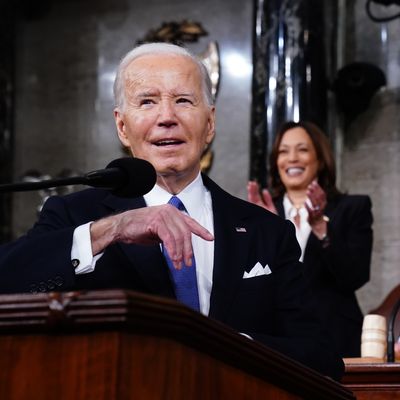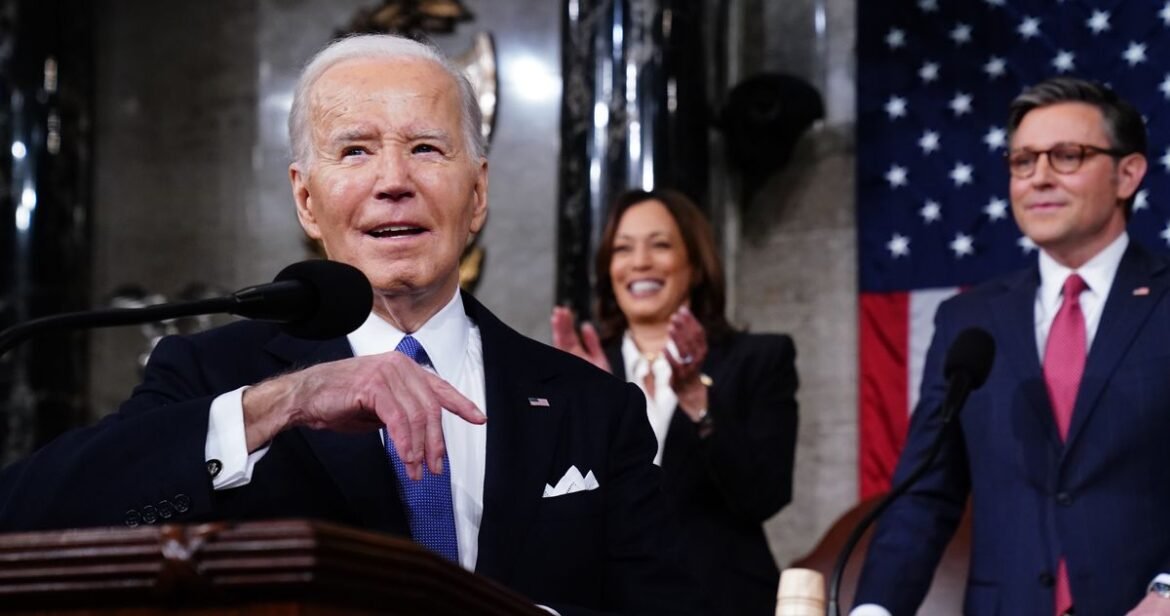
Photo: Shawn Thew/Bloomberg via Getty Images
Every State of the Union address is a big opportunity for the president in office to speak at length to an unusually large audience under the guise of assessing the country’s condition. This one, however, could be crucial to Joe Biden because of its timing. The intraparty rivals to his and Donald Trump’s nominations withdrew from contention earlier this week. There’s been a recent flare-up of worry about Biden’s age. The incumbent’s standing in general election trial polls has deteriorated significantly. The gap between perceptions of the economy and perceptions of the president’s economic stewardship is now getting large. There are also very real questions about what the country is doing on multiple fronts internationally as wars in Ukraine and the Middle East reach critical junctures.
So Biden took the podium before a joint session of Congress facing two critical political tasks if he hopes to win a second term in November: improving his job approval ratings, and vividly reminding people of the many risks associated with returning Donald Trump to power. The very aggressive State of the Union address Biden delivered showed the premium his camp places on the latter task. He got around to touting and defending his record. But he began with a scorching attack on Trump for “bowing down to Putin,” for “bury[ing] the truth of January 6,” and for reversing Roe v. Wade, bragging about it, and planning “to pass a national ban on reproductive freedom.” He ended this last line of attack by exclaiming: “My God, what freedoms will you take away next?” In a departure from his prepared text, he even warned the U.S. Supreme Court that they might soon feel the political power of women.
When Biden did turn to his own record of accomplishments, he regularly jabbed and mocked Trump and Republicans for their unpopular positions and obstructionism. Some attack lines were familiar, such as taunting the GOP for its ill-suppressed desire to cut Social Security and Medicare, and vowing to stop a renewal of Trump’s efforts to repeal Obamacare, protect Big Pharma, cut taxes on the wealthy, deny climate change, and stop gun safety efforts. Some lines were new, including Biden’s attack on “my predecessor” for not matching his tough talk on China with action.
Taking on his greatest policy vulnerability, the president also blasted Trump for blocking a bipartisan border deal. This last passage led to an extended, direct presidential confrontation with Marjorie Taylor Greene, who broke every rule of decorum by wearing a MAGA hat in the House chamber and had already accosted Biden before his address, handing him a button referring to the murder of University of Georgia student Laken Riley, allegedly by an undocumented immigrant. As she shouted at him, Biden challenged MTG, Trump and Congressional Republicans to forget about election-year politics and pass the border bill.
In perhaps the quietest section of the speech, Biden restated his position on the Israel-Hamas war, emphasizing not only his commitment to a two-state solution but his support for speeding aid to Gaza, as a few Democrats silently held up “Ceasefire Now” signs.
Biden saved perhaps his cleverest gambit for near the end, mentioning his own age (very much the elephant in every room Biden enters this year) but identifying Trump as the dark side of his own generation:
My lifetime has taught me to embrace freedom and democracy. A future based on the core values that have defined America. Honesty. Decency. Dignity. Equality. To respect everyone. To give everyone a fair shot. To give hate no safe harbor.
Now some other people my age see a different story. An American story of resentment, revenge, and retribution.
That’s not me.
Biden’s delivery was fiery, a bit rushed, and he occasionally stumbled over his words, but it was anything but low-energy. (Democratic Senator Raphael Warnock, a Baptist minister, told him immediately afterwards that “you were a Baptist preacher tonight!”) The address began what will clearly be a general election campaign full of sharp contrasts and sharper elbows, even as the incumbent seeks to battle a sour public attitude and connect his administration to improving conditions in the country.

